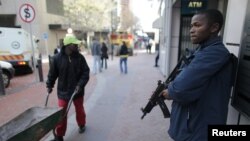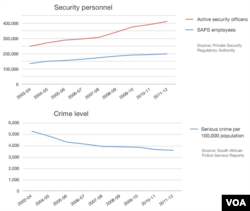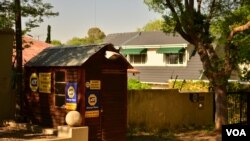JOHANNESBURG —
Violent crime has dropped in South Africa while the country’s private security industry has flourished. Experts say the sector likely will continue to thrive into the forseeable future, unless there is a basic, unexpected overall change in society.
Ask the average non-South African what comes to mind when they think of the country, and among the answers may be “murder capital of the world.”
OpenTravel.com lists Cape Town among the five most dangerous cities in the world, along with Mogadishu and New Orleans.
But Hamadziripi Tamukamoyo, a crime researcher at the Institute for Security Studies in Pretoria, said there is a common misperception that crime is rampant everywhere in South Africa, especially in the economic capital of Johannesburg.
“I think there is this sort of anomaly that people think Guateng [Province], where Johannesburg is, the murder capital of the world. That is not the case," said Tamukamoyo. "You might actually find 15 percent of police stations in S.A. account for 80 percent of murders. There are specific areas that have got high murder rates.”
Not only is violent crime isolated to certain areas, over the past decade it has dropped significantly. In its latest report in September, the South African Police Service said since 2003, the murder rate has dropped 28 percent, attempted murder is down 55 percent and assault is down 32 percent.
Yet during that same time period, South Africans have become more reliant on private security.
Stock analyst Peter Armitage, the CEO of Anchor Capital, covers two private security companies in South Africa. He said the industry is as strong as ever.
“If you have five robberies in a year - or 10 - you still need the same security," he said. "If there is a slight drop off in incidents, it does not mean the demand for services will drop. Unless things fundamentally change, there is no reason why people would have less security.”
In fact, since 2001, the number of active security officers in the country has more than doubled. Right now, there are 412,000 private security officers on the ground. The South African Police Service says it had about 194,000 paid employees in 2011.
Steve Conradie, the CEO of the Security Industry Alliance, said security companies play a considerable role in the nation’s economy, where the unemployment rate is about 25 percent.
“This industry, you should also remember, is the biggest employer of entry level jobs than any other industry in the country. That is quite significant from an employment point of view, as well,” said Conradie.
He agreed that South Africans are not likely to become complacent in terms of security anytime soon.
“Remember it is the individual’s choice to protect himself and his assets. So as long as that need is there for me and you to protect our families, or property, or even transport valuables, then I cannot see that this industry will look significantly different from what it looks now," said Conradie.
Drive down many of Johannesburg’s residential streets and you will catch glimpses only of roof tops, because the homes sit behind three-meter high security walls topped with electric fencing or barbed wire.
There are sheds every few blocks with private security officers sitting guard and you likely will drive by a security patrol truck. Nearly every home has a sign board advertising it is protected by a private security company, which will respond 24 hours day with arms as needed.
Ask the average non-South African what comes to mind when they think of the country, and among the answers may be “murder capital of the world.”
OpenTravel.com lists Cape Town among the five most dangerous cities in the world, along with Mogadishu and New Orleans.
But Hamadziripi Tamukamoyo, a crime researcher at the Institute for Security Studies in Pretoria, said there is a common misperception that crime is rampant everywhere in South Africa, especially in the economic capital of Johannesburg.
“I think there is this sort of anomaly that people think Guateng [Province], where Johannesburg is, the murder capital of the world. That is not the case," said Tamukamoyo. "You might actually find 15 percent of police stations in S.A. account for 80 percent of murders. There are specific areas that have got high murder rates.”
Not only is violent crime isolated to certain areas, over the past decade it has dropped significantly. In its latest report in September, the South African Police Service said since 2003, the murder rate has dropped 28 percent, attempted murder is down 55 percent and assault is down 32 percent.
Yet during that same time period, South Africans have become more reliant on private security.
Stock analyst Peter Armitage, the CEO of Anchor Capital, covers two private security companies in South Africa. He said the industry is as strong as ever.
“If you have five robberies in a year - or 10 - you still need the same security," he said. "If there is a slight drop off in incidents, it does not mean the demand for services will drop. Unless things fundamentally change, there is no reason why people would have less security.”
In fact, since 2001, the number of active security officers in the country has more than doubled. Right now, there are 412,000 private security officers on the ground. The South African Police Service says it had about 194,000 paid employees in 2011.
Steve Conradie, the CEO of the Security Industry Alliance, said security companies play a considerable role in the nation’s economy, where the unemployment rate is about 25 percent.
“This industry, you should also remember, is the biggest employer of entry level jobs than any other industry in the country. That is quite significant from an employment point of view, as well,” said Conradie.
He agreed that South Africans are not likely to become complacent in terms of security anytime soon.
“Remember it is the individual’s choice to protect himself and his assets. So as long as that need is there for me and you to protect our families, or property, or even transport valuables, then I cannot see that this industry will look significantly different from what it looks now," said Conradie.
Drive down many of Johannesburg’s residential streets and you will catch glimpses only of roof tops, because the homes sit behind three-meter high security walls topped with electric fencing or barbed wire.
There are sheds every few blocks with private security officers sitting guard and you likely will drive by a security patrol truck. Nearly every home has a sign board advertising it is protected by a private security company, which will respond 24 hours day with arms as needed.






